Trista Mateer, Honeybee



Trista Mateer, Honeybee
More Posts from Purposefullylackadaisical and Others




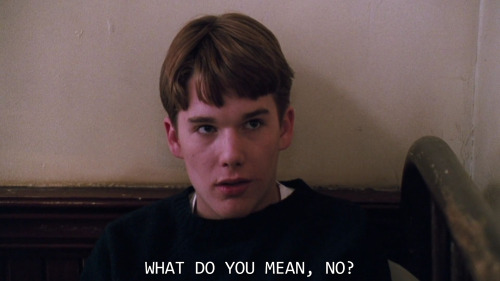












[it - stephen king // blood brothers - bruce springsteen // dead poets society (1989), dir. peter weir // maurice - e.m. forster // stand by me (1986), dir. rob reiner // bobby jean - bruce springsteen // no surrender - bruce springsteen // the body - stephen king]

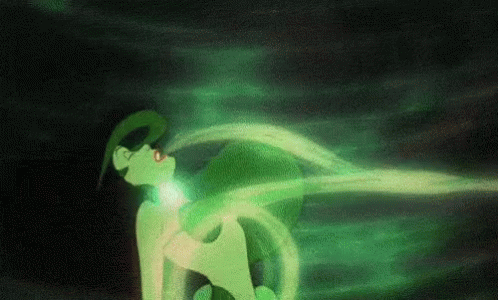


Venomous Silence
Vincent Van Gogh// The Little Mermaid// The Jacaranda Years, Yiwei Chai// "A Garden", Lyric Hunter//

Gillian Flynn, from Sharp Objects
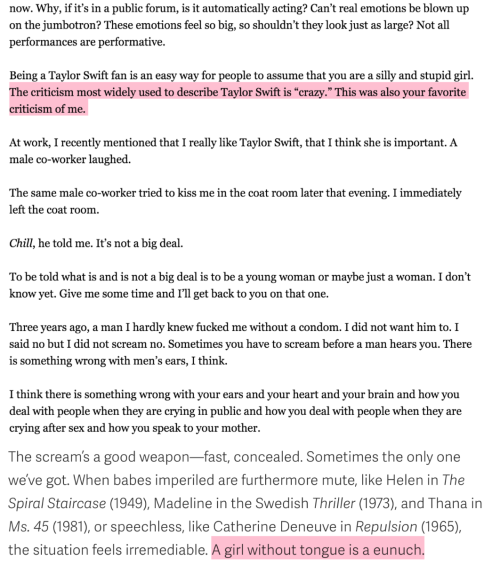
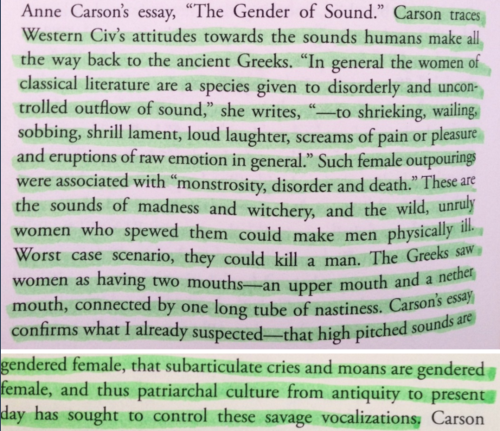
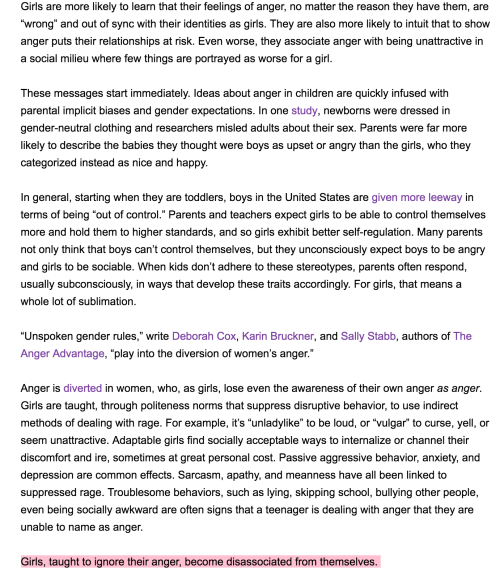


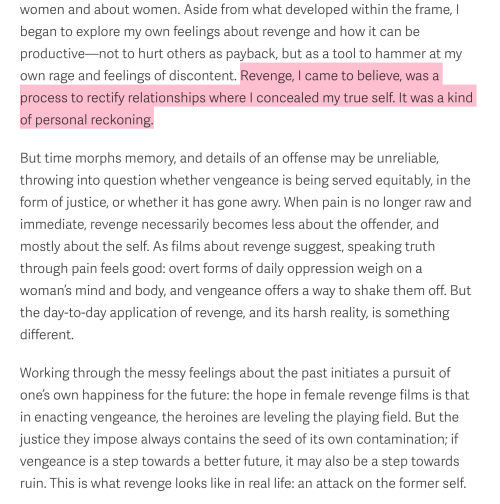
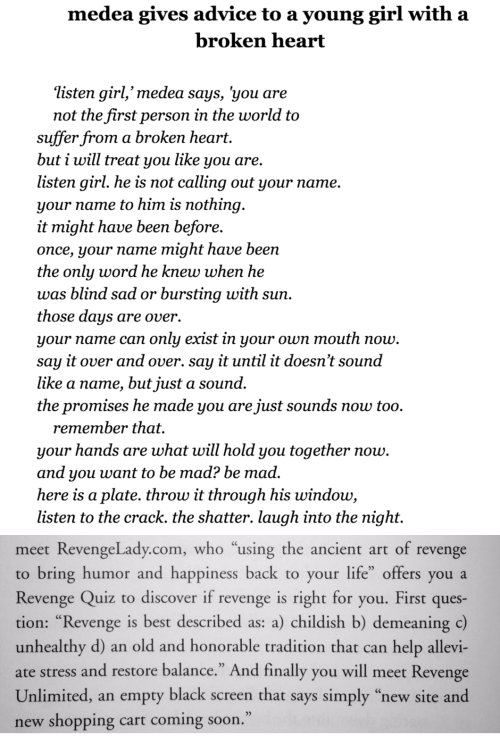
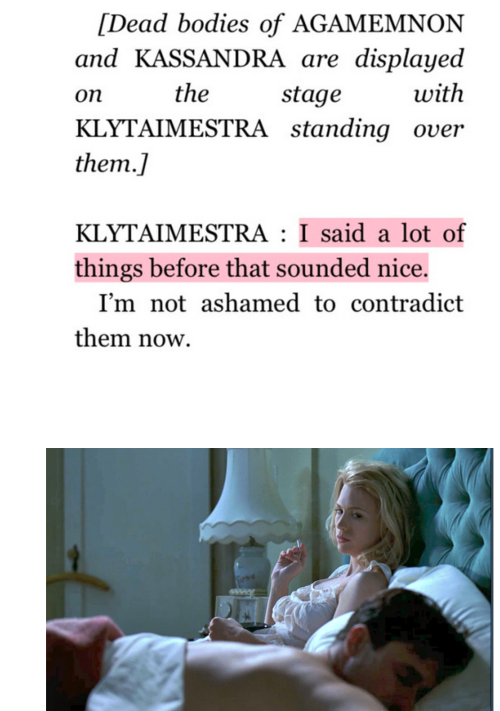
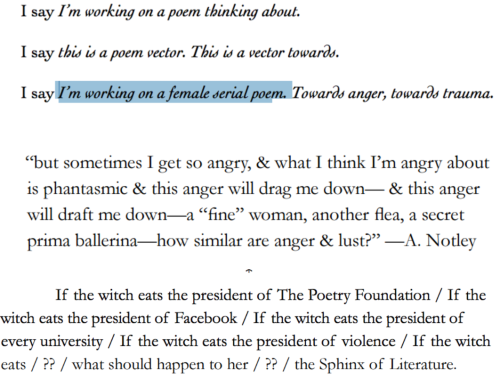
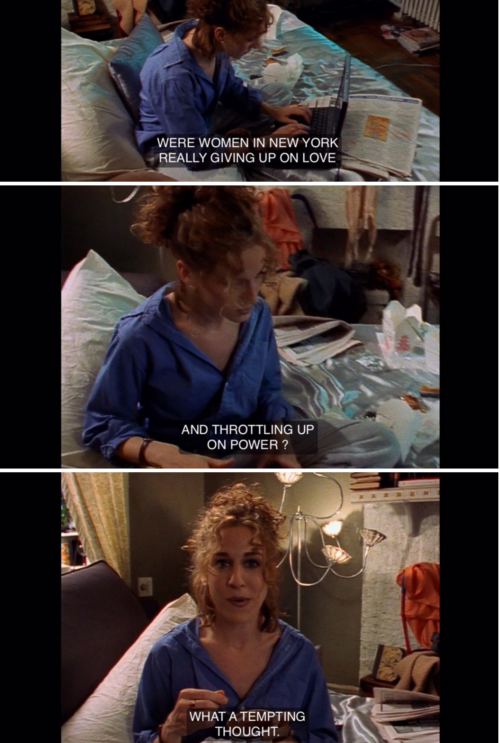
From the beginning: 1) from Michelle Lyn King’s Taylor Swift Youtube Videos 2) Sarah Nicole Prickett 3) from “Whistle While You Dixie” by Dodie Bellamy, When The Sick Rule The World4) From “Does Your Daughter Know It’s OK To Be Angry”? by Soraya Chemaly 5) a tumblr user paired this text with this dog image and I can’t refind it…if you see this, please let me know and also maybe where the agression text originated from? sry sry. 6) Dodie Bellamy 7) from Camila De Onis’s “Vengence Be Mine” 8) from Letters from Medea by Salma Deera 9) From Grief Lessons: Four Plays by Euripides by Anne Carson 10 )from Anne Carson’s translation of An Oresteia | Agamemnon by Aiskhylos 11) Mad Men still 12) from Helen or My Hunger by Gale Marie Thomson 13) Alice Notley, from Doctor Williams’ heiresses 14) From The Book of Repulsive Women by Carrie Lorig 15) Stills from Sex In the City
Hi, could you please make a web weaving about the childhood that you know won't come back?

oumaima, I Will Be Leaving the Party Early

@traumacure (x)

Li-Young Lee, A Hymn to Childhood

Taylor Swift, Never Grow Up

Gregory Orr, Origin of the Marble Forest

Andy Muschietti directing It: Chapter Two (via)

Mitski, Two Slow Dancers

Adonis, Celebrating Childhood (trans. Khaled Mattawa)



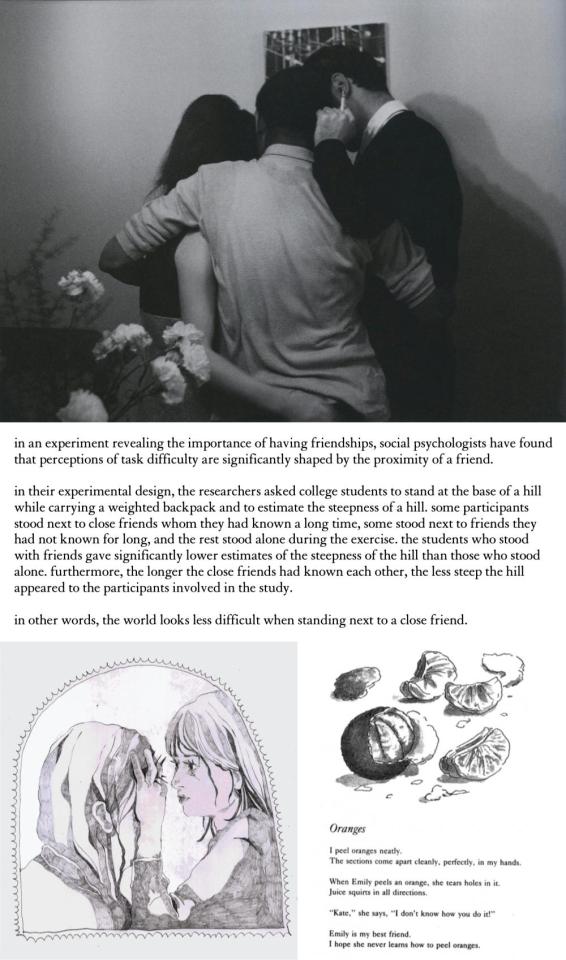


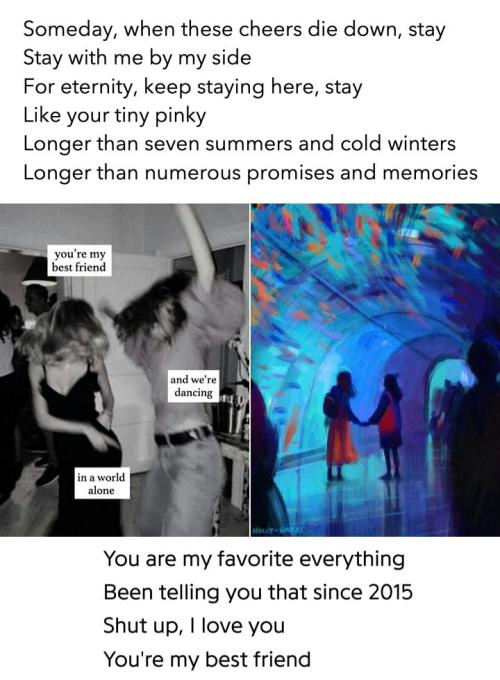
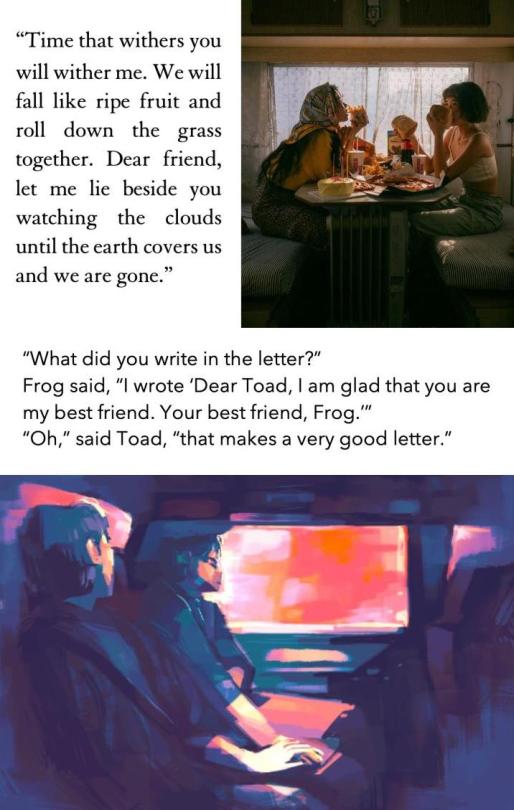

for @augustsjanes — we are each other’s mystery ♡
adam smiley poswolsky / bts, in the soop / nicole callihan, the end of the pier / henry james, the portrait of a lady / hanya yanagihara, a little life / holly warbs, swim / sarah kay, no matter the wreckage / david whyte, consolations / @piglitzart (x) / jacqueline woodson, weight / avatar: the last airbender, s3 ep6 / wicked, for good / sedat pakay, james baldwin & friends, istanbul / schnall, harber, stefanucci, & proffitt / @euritsua (x) / jean little, oranges / c.s. lewis, the four loves / anne magill, by the river / taylor jenkins reid, the seven husbands of evelyn hugo / isabel norton / pinterest / bts, friends / lorde, a world alone + pinterest / holly warburton, the old aquarium / lany, pink skies / jeanette winterson, written on the body / @edomrode (ig) / arnold lobel, frog and toad are friends / @piglitzart (x) / conan gray, best friend

Leila Chatti, I Dreamed I Forgot
when florence welch said “and everything i ever did was just another way to scream your name” and when mitski said “if you would let me give you pinky promise kisses then i wouldn’t have to scream your name atop of every roof in the city of my heart” and when taylor swift said “and i still talk to you when i’m screaming at the sky” and when phoebe bridgers said “there are no words in the english language i could scream to drown you out” and when oh pep said “heard you were yelling before you could talk” and when
what do you think drives lady macbeth's cruelty and do you sympathise with her at all?
This post and this post might be of interest. But I think ‘cruelty’ is the wrong word. Cruelty implies violence for the sake of violence and enjoyment of violence. (See here.) Lady M doesn’t revel in the violence. She doesn’t delight in it the way some of the characters in, say, Titus Andronicus do, or even Margaret in Henry VI does after the murder of Rutland/during the murder of York. For Lady M violence is always a means to an end. “Infirm of purpose” is what she calls her husband when he starts to get faint-hearted. He’s too full of the milk of human kindness “to catch the nearest way.” For her, it’s all about the outcome. The ends justify the means. Like I said in one of those posts, I think her driving force is ambition. She wants more than what she has.
Interestingly, she never expresses any personal desire to be queen. She does, however, use the singular possessive pronoun ‘my’ when she says “The raven himself is hoarse / That croaks the fatal entrance of Duncan / Under my battlements.” She claims the crime as her own, and even though the idea of murder occurs to her and her husband independently, she is the criminal mastermind. She says, “you shall put / This night’s great business into my dispatch; / Which shall to all our nights and days to come / Give solely sovereign sway and masterdom.” And at the end of the scene: “Leave all the rest to me.” This regicide is her baby–and I use that word very deliberately. There are a million possible explanations for why Lady Macbeth is so desperate to seize this power for her husband. My guess is it has something to do with that baby she mentions in 1.7 which doesn’t appear in the play. A woman’s function at this point in history was basically to be a baby-making machine and ensure the survival of her husband’s line. She hasn’t been able to do that (for whatever reason) and her husband, at least, is already middle-aged, so that procreation window is rapidly closing, if it’s not closed already. By early modern standards, that’s a huge dynastic failure. My guess is that her power-grabbing is about agency and compensation. Maybe she can’t continue Macbeth’s line, but she can make him king. And she does.
But here’s the other part of it which I think is really important and often gets overlooked, and it goes back to the fact that Lady M never expresses a personal desire to be queen. She wants her husband to be king, and she thinks he is fully deserving of that office. “Thou wouldst be great;” she says, “Art not without ambition, but without / The illness should attend it.” AND THIS IS SO KEY. Because Lady M is nothing if not full of ambition. What she’s saying here is “You don’t have enough darkness in your soul to do this, so I’m going to do it for you.” Now. Is that somewhat fucked up? Absolutely. However, that is an enormous sacrifice to make. I’m not going to get into this in depth, but there’s a lot of natural law theory floating around in this play. What’s important to know is this: In the protestant ethos of this play, if you commit regicide, you are 100% going to be damned for eternity. There’s no doubt about that. So, in an insane backwards way, this is actually an incredibly loving, selfless thing to do on Lady M’s part. She is willing to sacrifice her own salvation to make her husband king. Let that sink in. That is so much more hardcore than just saying, “I’d take a bullet for you, babe.” She is willing to burn for all time to put him on the throne, and not only is she willing, but it’s her idea, not just something she does with her back against the wall. That is a crazy kind of love. And that’s one of my favorite things about this play. This is not a unanimous opinion by any means, but I firmly believe that even though the Macbeths are terrible tyrannical people, they are desperately, devotedly in love with one another. Their language is incredibly intimate. In his first letter Macbeth addresses his wife as “My dearest partner of greatness,” and throughout the play they are constantly struggling to help and heal one another. Theirs is a relationship built on love and equality, whatever else they do (and however their relationship is also sometimes toxic and fractures through the play). Look at Macbeth’s conversation with the doctor in 5.3 when his wife’s health begins to fail: “If thou couldst, doctor, cast / The water of my land, find her disease, / And purge it to a sound and pristine health, / I would applaud thee to the very echo, / That should applaud again.” That. Is. Love.
So. Why does Lady Macbeth do the terrible things she does? There’s no certain answer. Ambition has a lot to do with it. But I think that ambition is rooted in guilt about what she hasn’t been able to provide her husband with, and a passionate yearning to make up for that, somehow. Leo’s character says in Inception that positive emotion trumps negative emotion every time, and I think that’s true here. Lady M doesn’t orchestrate Duncan’s murder because she’s inherently cruel. She does it for love.

franny choi
-
 lavenderinkstains liked this · 1 month ago
lavenderinkstains liked this · 1 month ago -
 devotedlyreblogging reblogged this · 2 months ago
devotedlyreblogging reblogged this · 2 months ago -
 wallsong reblogged this · 2 months ago
wallsong reblogged this · 2 months ago -
 xshexwaitedxaxlifextimex liked this · 2 months ago
xshexwaitedxaxlifextimex liked this · 2 months ago -
 randomoneblr reblogged this · 3 months ago
randomoneblr reblogged this · 3 months ago -
 flyingkitesman liked this · 3 months ago
flyingkitesman liked this · 3 months ago -
 fortheloveofablackstar reblogged this · 3 months ago
fortheloveofablackstar reblogged this · 3 months ago -
 fortheloveofablackstar liked this · 3 months ago
fortheloveofablackstar liked this · 3 months ago -
 couleur-mer liked this · 3 months ago
couleur-mer liked this · 3 months ago -
 couleur-mer reblogged this · 3 months ago
couleur-mer reblogged this · 3 months ago -
 plumchaos reblogged this · 4 months ago
plumchaos reblogged this · 4 months ago -
 lavendulaes reblogged this · 4 months ago
lavendulaes reblogged this · 4 months ago -
 ghostingthespace reblogged this · 4 months ago
ghostingthespace reblogged this · 4 months ago -
 limpspagheti liked this · 4 months ago
limpspagheti liked this · 4 months ago -
 devotedlystarstruckartisan liked this · 4 months ago
devotedlystarstruckartisan liked this · 4 months ago -
 flossibelle liked this · 4 months ago
flossibelle liked this · 4 months ago -
 heteroglossic reblogged this · 4 months ago
heteroglossic reblogged this · 4 months ago -
 chronotopes liked this · 4 months ago
chronotopes liked this · 4 months ago -
 officiallytoast liked this · 4 months ago
officiallytoast liked this · 4 months ago -
 celestialbee reblogged this · 4 months ago
celestialbee reblogged this · 4 months ago -
 ragingtrash liked this · 4 months ago
ragingtrash liked this · 4 months ago -
 tommykinard217 liked this · 4 months ago
tommykinard217 liked this · 4 months ago -
 michaelormewood reblogged this · 4 months ago
michaelormewood reblogged this · 4 months ago -
 seventeen-tracks liked this · 4 months ago
seventeen-tracks liked this · 4 months ago -
 cakeicecreamandicecreamcake liked this · 4 months ago
cakeicecreamandicecreamcake liked this · 4 months ago -
 disabilitymissunderstood reblogged this · 4 months ago
disabilitymissunderstood reblogged this · 4 months ago -
 disabilitymissunderstood liked this · 4 months ago
disabilitymissunderstood liked this · 4 months ago -
 masterbanana777 liked this · 5 months ago
masterbanana777 liked this · 5 months ago -
 stumblingoverchaos liked this · 5 months ago
stumblingoverchaos liked this · 5 months ago -
 dearparentheses reblogged this · 5 months ago
dearparentheses reblogged this · 5 months ago -
 internet-grab-my-tumblr reblogged this · 5 months ago
internet-grab-my-tumblr reblogged this · 5 months ago -
 blueskinnedbuzzcut liked this · 6 months ago
blueskinnedbuzzcut liked this · 6 months ago -
 heartinthemarketplace liked this · 6 months ago
heartinthemarketplace liked this · 6 months ago -
 thelostself reblogged this · 6 months ago
thelostself reblogged this · 6 months ago -
 thelostself liked this · 6 months ago
thelostself liked this · 6 months ago -
 sewickedthread liked this · 6 months ago
sewickedthread liked this · 6 months ago -
 skrybspryt reblogged this · 6 months ago
skrybspryt reblogged this · 6 months ago -
 skrybspryt liked this · 6 months ago
skrybspryt liked this · 6 months ago -
 limetimo reblogged this · 6 months ago
limetimo reblogged this · 6 months ago -
 thefamjewels liked this · 6 months ago
thefamjewels liked this · 6 months ago -
 onikasdae liked this · 6 months ago
onikasdae liked this · 6 months ago -
 twilightfarewell liked this · 6 months ago
twilightfarewell liked this · 6 months ago -
 pocketsofsunshine liked this · 6 months ago
pocketsofsunshine liked this · 6 months ago -
 wallsong reblogged this · 6 months ago
wallsong reblogged this · 6 months ago -
 orchidsgarden liked this · 6 months ago
orchidsgarden liked this · 6 months ago -
 sbooksbowm liked this · 6 months ago
sbooksbowm liked this · 6 months ago -
 crescendolives liked this · 6 months ago
crescendolives liked this · 6 months ago -
 dearparentheses liked this · 6 months ago
dearparentheses liked this · 6 months ago
95 posts